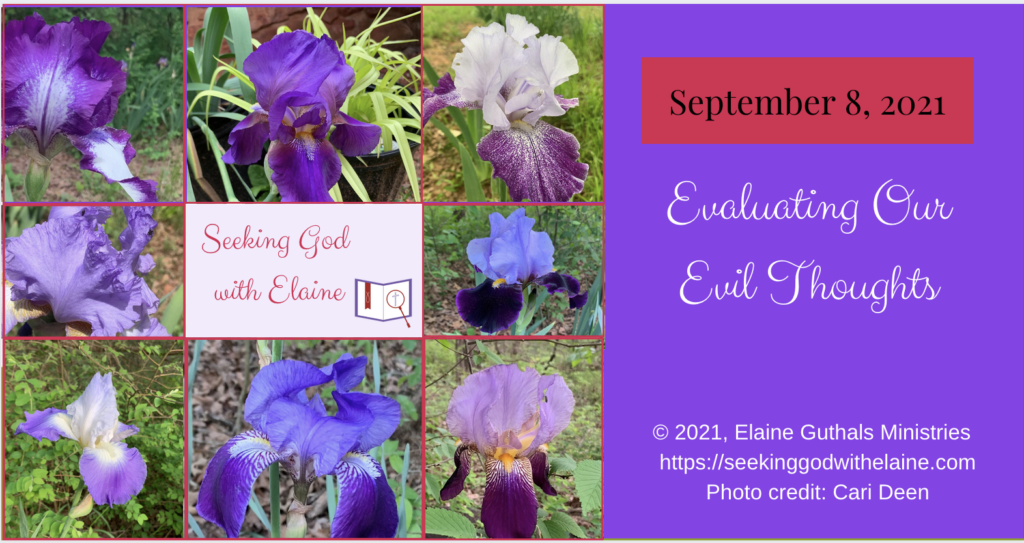As disciples, we don’t want to have evil thoughts in our lives. This daily devotional looks at how we evaluate ourselves to focus, not on our evil thoughts, but on God and His standards for our lives.
Nuggets
- God tells us several times in His Word to evaluate ourselves based on His standards.
- It is important that we do not lose the initial joy of our conversion.
- Meditating is when we evaluate our lives by thinking things through.
- We use our evaluation to educate our thoughts to increase our worship and use our worship to educate our thoughts..
To read devotions in the Redo for Godliness series, click the appropriate button below.
Devotions in the How Do We Live Godly Lives? series

Charnock moved on in his sermon to give us some practical applications on how to order our evil thoughts.
“The third sort of directions are for the ordering of evil thoughts, when they do intrude … Examine them. Look often into your heart to see what it is doing; and what thoughts you find dabbling in it call to an account; inquire what business they have, what their errand and design is, whence they come, and whither they tend” (Charnock, The Sinfulness and Cure of Thoughts)
I don’t know if it is a side effect of the medicine, or if it is a front that is going through. For the past two days, I have felt dizzy.
So, what I am going to do for this post is see what we’ve said before. We’ve talked about evaluating ourselves a lot. Let’s see if we can combine some of it into one post and look at it through the lens of evaluating our thoughts.
Let's Put It into Context #1
We’ve been looking at Charnock’s sermon entitled The Sinfulness and Cure of Thoughts to show us how to cleanse, a.k.a. sanctify, our thought processes. Charnock has taught us
- that we cleanse our thoughts when we return to having a strong relationship with God. We can do that by studying the Scriptures, meditating on God, contemplating on His creation, and praising Him.
- that we focus our thoughts by being humble instead of prideful, following God instead of the worldview, working instead of being idle, and laboring for Him.
- that we overcome our evil thoughts by burying ourselves in Scripture, relying on His omniscience and judgment, and guarding our hearts and lips.
Resource
Glossary
Here is a running list of what we’ve discussed previously.
We Are to Evaluate Ourselves
“Let each person examine his own work, and then he can take pride in himself alone, and not compare himself with someone else” (Gal. 6: 4 CSB)
God tells us several times in His Word to evaluate ourselves based on His standards.
First, we need to make sure we know the goal we are trying to reach.

God tells us several times in His Word to evaluate ourselves based on His standards.
First, we need to make sure we know the goal we are trying to reach.
How do we get there? We have to figure out where we are at and what we need to to do to get to where God wants us to be.
- Is our faith as deep as it could be?
- If not, in what areas are we lacking?
- What is God calling us to do to address that?
- To where is He calling us?
Related Links
I have created a worksheet of the questions above. Click on the button below to access it.
To read a related devotion, click the button below.
We Are not to Lose Our First Love
“But I have this against you: You have abandoned the love you had at first” (Rev. 2: 4 CSB)
It is important that we do not lose the initial joy of our conversion.
We don’t want to go backwards. We don’t want to lose our first love.
Let’s work this through. Jesus said we are to come as little children. “‘Truly I tell you,’ he said, ‘unless you turn and become like little children, you will never enter the kingdom of Heaven’” (Mt. 18: 3 CSB).
We know the joy that the have with something new. It is the spiritual love we shouldn’t lose.
Hull made an excellent point. “The loss of the first freshness of spiritual emotion is not necessarily a decline of spiritual love. The early excitement is not strength — true strength comes when it passes into action.” This seems to be where the Ephesians were.
Resource
In a way that seems contradictory, doesn’t it? If the spiritual emotion is going down, doesn’t that mean the spiritual love is too?
I don’t think so. It is hard to keep something bright and shiny new. As we get farther and farther away from conversion, we become more familiar with the concept of being saved. It is more who we are rather than who we’ve become.
So, the emotion can go down or stay the same. But the love is supposed to go up.
We are supposed to go from milk babies to steak adults. We are supposed to grow in grace and knowledge. That means we are to grow in love.
We also call that navigating the Sanctification Road. We know we need to grow so that we will be imitating God.
- Sanctification is the transformation of mind, body, and soul, which begins with regeneration, gradually changes our nature through the promptings of the Holy Spirit, and ends with perfected state of spiritual wholeness or completeness.
- Regeneration is being changed from spiritually dead to spiritually alive and the internal requickening in us that God brings about through the work of the Holy Spirit to give us new character.
- Spiritual death is the separation from God that occurred as a consequence of Adam and Eve’s original sin. The spiritually alive are those who have ABCDed, so they are no longer separated from God.
- The perfected state indicates the combination of the spiritual graces which, when all are present, form spiritual wholeness or completeness.
- Spiritual graces are worldly morals that have been submitted to God to further His kingdom instead of enhancing this world.
The ABCDs of Salvation
If you have not become a believer in Christ, please read through the
Plan of Salvation and prayerfully consider what God is asking you to do.
A – admit our sins
B – believe His Son Jesus is our Redeemer
C – confess God as Sovereign Lord
D – demonstrate that commitment by making any changes needed in our lives to
live the way in which God has called us
The Disciple’s Job Description
Glossary
To read a devotion in the First Love series, click on the button below.
Related Links
I have created a worksheet of the questions above. Click on the button below to access it.
To read a related devotion, click on the appropriate button below.
We Are to Evaluate Ourselves by Meditating on Him
“Be angry, and do not sin; ponder in your own hearts on your beds, and be silent. Selah” (Ps. 4: 4 ESV)
Meditating is when we evaluate our lives by thinking things through.
Really, when we are meditating, we are seeking God. But it is also more than that.
It is applying what we are hearing and reading. We do this by what Hickman called “… exercise and application of the mind.” That can only happen through our thought processes.
Resource
We will only grow when we think it through. If our faith is described as beliefs, a.k.a. the assent of the mind, it will only grow through exercises of the mind.
To read a related devotion, click the button below.
We should evaluate every part of ourselves. Our guide should be the Scriptures. It shouldn’t be what I say or what someone else says. It should be what God says.
Oh, what I or someone else says can be used to jumpstart your thinking. But the standard is set by God. We should use what He says to evaluate things.
To read a related devotion, click the button below.
We Are to Use Our Evaluation to Increase Worship
“For the Spirit God gave us does not make us timid, but gives us power, love and self-discipline” (II Tim. 1: 7 NIV)
We use our evaluation to educate our thoughts to increase our worship and use our worship to educate our thoughts.
Where is all this evaluating going? What are our end goals?
Yes, we are trying to further ourselves along the Sanctification Road if it is a continuum. We want the outcome to be we have God’s character in us.
I think God’s end goal is to have us worship Him. We have to have His character so we can enter Heaven, but once we are there, we will worship Him for eternity.
Right now, we can use the worship to educate our thoughts.
Statham wrote, “The instincts of a fervent Christian man will resent all that is showy and formal, and will rejoice in all that lifts his heart and his thoughts into communion with the living God.” It’s that last part that hooked me.
Resource
Worshiping God puts us in communion with Him. When we are talking with Him and listening to Him, that focuses our thoughts on the promptings of the Holy Spirit.
Talking to God and listening to Him is a form of worship.
Statham called meditation the preparation for prayer. How many times do we just start praying with no forethought?
If we look at it as meditation is where we evaluate our lives, meditation informs our prayer, and prayer informs our life. We see God’s hand controlling our lives. This is what He wants.
I don’t think it is just because God wants to control us. It is more that we are putting God as our priority. We are giving Him the controls.
To read a related devotion, click the button below.

Making the Connections
Okay. I didn’t know what to expect when I started writing this. I’m not sure I expected that.
But I see a progression. It has to be.
This is important because God doesn’t want us to stay as we are at conversion. He wants us to grow in knowledge and grace.
When we evaluate ourselves, we focus our thoughts on God. It will help us corral the evil thoughts with which Satan tries to trip us up.
How Do We Apply This?
We have to find ways to evaluate ourselves. We have to take a realistic look at our lives against God’s standard.
That means we have to know what God’s standard is. We have to read about it. We have to meditate on it. We have to live it.
Father God. We want to live up to Your standard. We know that we have to give up worldview standards in order to do that. Help us to become more like You. Amen.
Searching for and Seeking God
Hearing His Word (Rom. 10: 17).
Reading His Word (Rev. 1: 3).
Praying to Him (Heb. 4: 16).
Studying His Word (Ac. 17: 11).
Meditating on His Word (Ps. 1: 1-2).
Memorizing His Word (Ps. 119: 11).
What do you think?
Leave me a comment below (about this or anything else) or head over to my Facebook group for some interactive discussion.
If you don’t understand something and would like further clarification, please contact me.
If you have not signed up for the email daily or weekly providing the link to the devotions and the newsletter, do so below.
If God has used this devotion to speak with you, consider sharing it on social media.
Pingback: Recognizing Evil Thoughts – Seeking God with Elaine